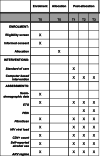Computer-based alcohol reduction intervention for alcohol-using HIV/HCV co-infected Russian women in clinical care: study protocol for a randomized controlled trial
- PMID: 33596972
- PMCID: PMC7887790
- DOI: 10.1186/s13063-021-05079-x
Computer-based alcohol reduction intervention for alcohol-using HIV/HCV co-infected Russian women in clinical care: study protocol for a randomized controlled trial
Abstract
Background: Russia has a high prevalence of human immunodeficiency virus (HIV) infections. In 2018, over one million persons were living with HIV (PLWH); over a third were women. A high proportion of HIV-infected women are co-infected with hepatitis C virus (HCV), and many consume alcohol, which adversely affects HIV and HCV treatment and prognosis. Despite the triple epidemics of alcohol use, HIV and HCV, and the need for interventions to reduce alcohol use among HIV/HCV co-infected women, evidence-based alcohol reduction interventions for this vulnerable population are limited. To address this gap, we developed a clinical trial to evaluate the efficacy of a computer-based intervention to reduce alcohol consumption among HIV/HCV co-infected women in clinical care.
Methods: In this two-arm parallel randomized controlled trial, we propose to evaluate the efficacy of a culturally adapted alcohol reduction intervention delivered via a computer for HIV/HCV co-infected Russian women. The study population consists of women 21-45 years old with confirmed HIV/HCV co-infection who currently use alcohol. Intervention efficacy is assessed by a novel alcohol biomarker, ethyl glucuronide (EtG), and biomarkers of HIV and HCV disease progression. Women are randomized to trial conditions in a 1:1 allocation ratio, using a computer-generated algorithm to develop the assignment sequence and concealment of allocation techniques to minimize assignment bias. Women are randomized to either (1) the computer-based alcohol reduction intervention or (2) the standard-of-care control condition. We will use an intent-to-treat analysis and logistic and linear generalized estimating equations to evaluate intervention efficacy, relative to the standard of care, in enhancing the proportion of women with a laboratory-confirmed negative EtG at each research study visit over the 9-month follow-up period. Additional analyses will evaluate intervention effects on HIV (viral load and CD4+ levels) and HCV markers of disease progression (FibroScan).
Discussion: The proposed trial design and analysis provides an appropriate conceptual and methodological framework to assess the efficacy of the computer-based intervention. We propose to recruit 200 participants. The intervention, if efficacious, may be an efficient and cost-effective alcohol reduction strategy that is scalable and can be readily disseminated and integrated into clinical care in Russia to reduce women's alcohol consumption and enhance HIV/HCV prognosis.
Trial registration: ClinicalTrials.gov NCT03362476 . Registered on 5 December 2017.
Keywords: Alcohol reduction intervention; Computer-delivered alcohol intervention; HIV; HIV/HCV co-infection; Hepatitis C virus; Randomized controlled trial; Russia; Service integration; Women.
Figures
References
-
- UNAIDS . Country: Russian Federation. 2019.
-
- World Health Organization . Global hepatitis report 2017. Geneva: World Health Organization; 2017.
-
- Brown JL, DiClemente RJ, Sales JM, Rose ES, Safonova P, Levina OS, et al. Substance use patterns of HIV-infected Russian women with and without hepatitis C virus co-infection. AIDS Behav. 2016;20(10):2398–2407. - PubMed
-
- Degenhardt L, Peacock A, Colledge S, Leung J, Grebely J, Vickerman P, et al. Global prevalence of injecting drug use and sociodemographic characteristics and prevalence of HIV, HBV, and HCV in people who inject drugs: a multistage systematic review. Lancet Glob Health. 2017;5(12):e1192–ee207. - PMC - PubMed
Publication types
MeSH terms
Associated data
Grants and funding
LinkOut - more resources
Full Text Sources
Other Literature Sources
Medical
Research Materials
Miscellaneous



